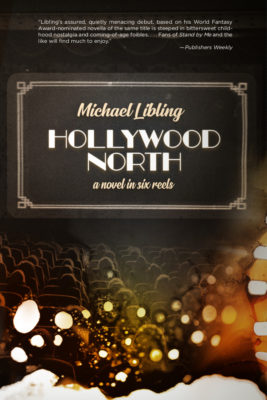Hollywood North paints a dark portrait of Trenton, Ontario. This institutional port town is a gateway to the Trent-Severn Waterway and Prince Edward County, and it has a storied history as an epicentre for tragedy. Author Michael Libling pushes his hometown’s reputation to the extreme, and he would have us believe it to be the township of Quinte’s own Bermuda Triangle, with a forever-burning creosote plant, tragic fires, unexplained plane crashes, wartime losses, train derailments, drownings (so many drownings!), and various traffic accidents. A town of bullies, dismembered body parts, mass graves, disfigured and damaged citizens in a time of sexism and corporal punishment.
By the end of the First Reel, it was apparent that Hollywood North is a book a baby boomer would really get. The novel is chock-full of pop culture tidbits that reference a fading moment: Rod Serling’s Twilight Zone, Ripley’s Believe It
or Not!, Little Rascals, Gene Autry, House of Wax. A perfect snapshot of boyhood in the ’60s emerges, a small-town Ontario experience steeped in whiteness.

Hollywood North
A Novel in Six Reels
Michael Libling
ChiZine Publications
$21.99
paper
358pp
978177148909
Normally, this would make me put a book down forever. But I pressed on, purposefully reading beyond my bias. Turns out the narrator doesn’t like anybody at all, himself included. Gus’s outlook borders on misanthropic, to the extent that he can barely acknowledge his best friend as anything other than an “annoying prick.” Gus quite simply views the world through the darkest, foggiest lens. And why shouldn’t he? This is fantasy-noir after all, and young Gus is learning the hard way that the world is hardly fair, and that Trenton, Ontario is full of jerks and creeps.
The book is broken into six “reels,” each of which are paced like unedited footage, slowly revealing a collection of tableaux that together illustrate the unfortunate lives of Gus and friends. There isn’t much that’s transcendent about the characters. They are about as cold and noir as the town they live in, aptly described in the book as a “borough abustle with simpletons and sycophants.”
There is a playful nature to the darkness, as the text is interspersed with TV Guide–style blurbs that recap a moment and silent movie intertitle cards that offer more cryptic commentary. These intertitles later play into a key narrative point, but there’s a bit of fussiness in these flourishes that makes the nod to filmmaking overwrought.
Libling is a commanding and economical writer. Hollywood North is fun to digest, with many clever chuckles, a great sense of wit, and excellent hard-boiled dialogue. Yet the overarching glass-half-empty mood makes for quite the opposite of a feel-good read. A feel-bad read: one where (spoiler alert) everyone dies, where fate can be prescribed by human intervention, and when coming out on top can still leave a person at the bottom. mRb






0 Comments